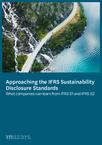
Approaching the IFRS Sustainability Disclosure Standards
The first IFRS Sustainability Disclosure Standards – IFRS S1 and IFRS S2 – issued by the ISSB (International Sustainability Standards Board) lay the foundation of a global baseline of sustainability-related disclosures.
They build upon a number of widely accepted standards and frameworks including the Integrated Reporting Framework, the recommendations of the Task Force on Climate-Related Financial Disclosures (TCFD) and the SASB (Sustainability Accounting Standards Board) Standards. Their interoperability with mandatory reporting frameworks, including the European Sustainability Reporting Standards (ESRS), will be key to avoid multiple reporting for companies. The ISSB is also committed to working with the Global Reporting Initiative (GRI) to ensure its standards are complementary to and compatible with existing GRI standards.
The ISSB Standards have been designed to complement the IFRS Accounting Standards used by over 140 jurisdictions worldwide. The ISSB does not have the right to mandate their application. However, companies can voluntarily apply them, and jurisdictional authorities can decide whether companies should apply them. Some jurisdictions have already announced their intentions to be early adopters, notably among the emerging and developing markets (e.g., Mexico, Nigeria and Zimbabwe), and others have even already set out plans to incorporate the ISSB Standards into their upcoming requirements (UK and Japan).
IFRS S1
The requirements laid out by IFRS S1 stem from the principle that sustainability information is useful to primary users (e.g. investors, lenders, other creditors) in order to understand the dynamics between a company and its stakeholders, society, the economy and the environment and their links towards the company’s ability to create value. IFRS S1 thus requires companies to disclose information on sustainability-related risks and opportunities that could reasonably be expected to affect the company’s prospects.
IFRS S1 sets out both general requirements to ensure compliance with ISSB Standards and essential elements of a complete set of sustainability-related financial disclosures. This Standard is similar to a “conceptual framework” and shall be applied in conjunction with other IFRS Sustainability Disclosure Standards. It lists practical sources of guidance and includes also specific requirements on connected information.
IFRS S2
IFRS S2 is the first ISSB topical standard with additional topics expected to be covered by other standards in the coming years. This Standard namely focuses on physical risks (climate change risks resulting from an event or a long-term shift) and climate-related transition risks (related to the transition to a lower-carbon economy). Some of the key disclosures of IFRS S2 aim at providing an understanding of:
- The company’s strategy for managing climate-related risks and opportunities, notably through the assessment of the company’s climate resilience, using climate-related scenario analysis.
- The company’s performance in relation to these risks and opportunities, including progress towards any targets it has set and/or which it is required to meet. Several metric categories have been identified for that purpose, such as, for example, greenhouse gas emissions (Scope 1, Scope 2 and Scope 3) and financial metrics (including the amount of capital expenditure, financing or investment deployed towards those risks and opportunities).
IFRS S2 also includes disclosure requirements on current and anticipated financial effects of climate-related risks and opportunities on a company’s financial performance, financial position and cash flows.
Application date
IFRS S1 and IFRS S2 are effective for annual reporting periods starting from 1 January 2024 (earlier application is permitted if both Standards are adopted early). In practice, the first-time application date will depend on the endorsement by local jurisdictions or on whether a company decides to voluntarily apply these Standards. Some transitional reliefs have also been set by the ISSB.
To learn more about the new ISSB standards, their background, implications and how to navigate them, download our latest guide, “Approaching the IFRS Sustainability Disclosure Standards: what companies can learn from IFRS S1 and IFRS S2”.








